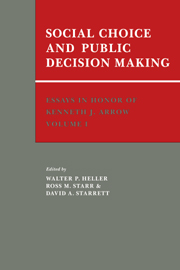Book contents
- Frontmatter
- Contents of Volumes I, II, III
- List of contributors
- Editors' preface
- Kenneth J. Arrow
- Contents
- PART I SOCIAL CHOICE
- 1 Consequentialist social norms for public decisions
- 2 Information and invariance in normative choice
- 3 Utilitarian morality in a world of very half-hearted altruists
- 4 On the implementation of social choice rules in irrational societies
- 5 Walrasian social choice: some simple axiomatic approaches
- PART II DECISION MAKING IN THE PUBLIC SECTOR
- Author index
3 - Utilitarian morality in a world of very half-hearted altruists
Published online by Cambridge University Press: 05 November 2011
- Frontmatter
- Contents of Volumes I, II, III
- List of contributors
- Editors' preface
- Kenneth J. Arrow
- Contents
- PART I SOCIAL CHOICE
- 1 Consequentialist social norms for public decisions
- 2 Information and invariance in normative choice
- 3 Utilitarian morality in a world of very half-hearted altruists
- 4 On the implementation of social choice rules in irrational societies
- 5 Walrasian social choice: some simple axiomatic approaches
- PART II DECISION MAKING IN THE PUBLIC SECTOR
- Author index
Summary
Utilitarianism and rationality
Utilitarianism is an attempt to choose our moral standards by rational criteria and, more specifically, by asking what moral standards would maximize expected social utility. Here the adjective “expected” is short for “the expected value of” whereas social utility itself is defined either as the sum or as the arithmetic mean of all individuals' utility levels in the relevant society. (Some utilitarians prefer the first definition, others prefer the second. But, in actual fact, in analyzing specific moral problems, other than those of population policy, the total number of individuals can be regarded as given so that maximizing the sum of individual utilities will be mathematically equivalent to maximizing their arithmetic mean.) These definitions, of course, presuppose that individual utilities are cardinally measurable and admit of meaningful interpersonal comparisons (cf. Harsanyi 1955, 1976, Chapter 4).
No doubt, nonutilitarians will deny that social utility is the right criterion for morality. But it seems to me that, even for nonutilitarian social scientists and philosophers, it should be a question of some interest what kind of social standards would in fact maximize social utility.
As is well known, there are two alternative interpretations of utilitarian theory. One is act utilitarianism, which defines a morally right action as one that would maximize expected social utility in the current situation. The other is rule utilitarianism, which makes the choice of a morally right action into a two-step procedure.
- Type
- Chapter
- Information
- Essays in Honor of Kenneth J. Arrow , pp. 57 - 74Publisher: Cambridge University PressPrint publication year: 1986
- 2
- Cited by



